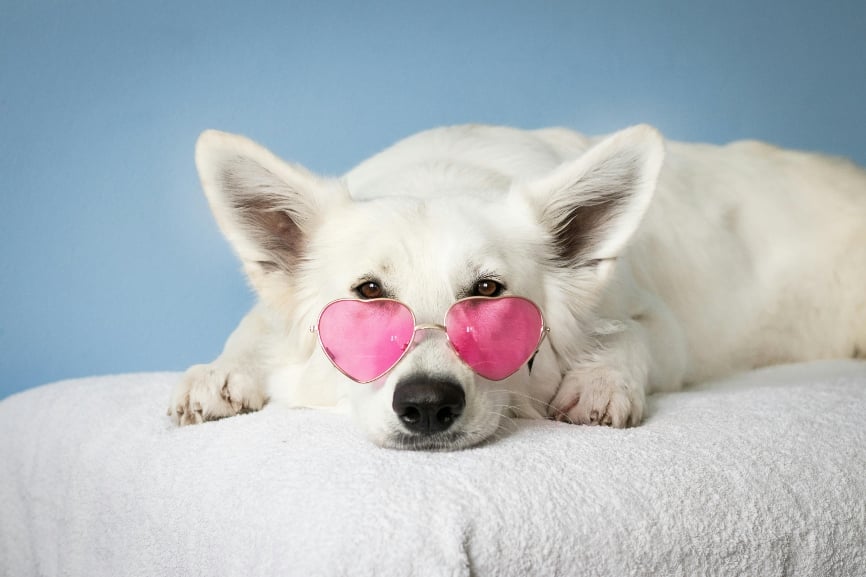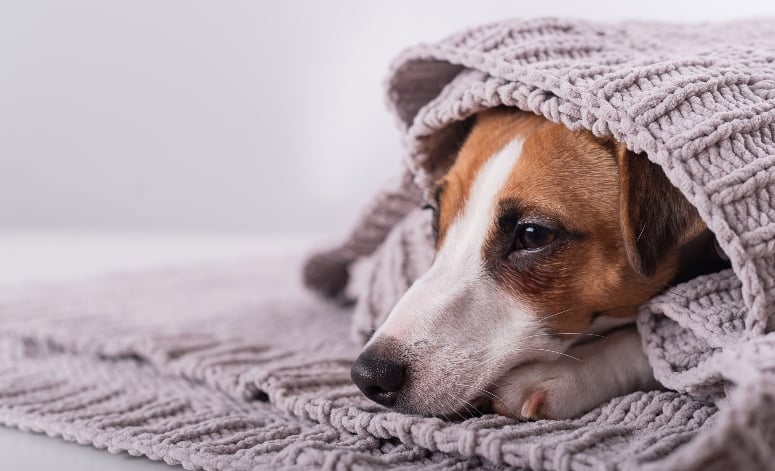Have you ever spotted your passed-out pup in her favorite sun-drenched corner of the house twitching and ruffing ever-so-audibly? We were super curious about this sleep “twitching” situation—Is she dreaming? Could she be in pain?!—our friends at Ollie reached out to integrative veterinarian Dr. Carol Osborne, DVM to ask her questions on the matter and whether or not we should ever be worried that it’s something more serious.
I’ve spotted my dog twitching—moving her paw, wagging her tail, rolling her eyes, even bark-muttering—in her sleep. What’s happening?
“Dogs, like people, dream while they sleep. There are three stages to your dog’s dreams: NREM, which is non-rapid eye movement; REM, which is rapid eye movement; and SWS or short-wave sleep. During the deep REM phase of sleep many dogs—and even people—may twitch, shake, paddle or even bark a bit. These involuntary movements are usually brief. In addition, your dog will be sleeping peacefully, their eyes will be partially or completely closed, and their body supple and relaxed. Experts theorize that these dogs are likely chasing squirrels, maybe the neighborhood cat or perhaps they are dreaming about a big juicy bone.”
People have said that I should wake your dog up gently if you see them twitching. Is that true?
“Absolutely not, everyone’s heard the phrase ‘let sleeping dogs lie.’ It’s probably best to just let your dog enjoy their dream as opposed to waking them up and startling them. It’s interesting to note that puppies and senior aged canines tend to twitch more in their sleep than adult dogs. Truthfully, though, there’s no cause for concern.”
What’s the difference between benign twitching and serious seizures?
“Benign twitching while asleep is normal. Your dog’s body will be flexible and relaxed, breathing appears normal, their eyes are partially or completely closed and they will awaken easily and respond to your voice. During a seizure, which usually occur while dogs are awake, your dog’s body will stiffen; their respiratory rates are often labored, their eyes are usually wide open; they will be unconscious and non-responsive to your voice. After a seizure many dogs are dazed, a bit confused and/or somewhat disoriented; after a nice nap your canines cognition and mental state are normal.”
Can certain diets affect dreams or twitching?
“’You are what you eat’ applies to people and pets. Nutrition is paramount to your dog’s health. Diets, various medications, especially flea and tick products, even some essential oils can cause, affect and exacerbate a variety of health conditions that can lead to epileptic seizures. For example, elevated blood sugar levels as with diabetes; kidney and/or liver disorders and some heart conditions can be associated with seizures. A visit your veterinarian along with a complete blood panel will help to determine if any of these issues might be the underlying cause if your dog is seizing. If the underlying cause can be diagnosed and treated, then the seizures will resolve. For example, if your dog has elevated blood sugar and is a diabetic, proper treatment with insulin will eliminate the seizures and manage the diabetes. Whether or not diets affect dreams is not certain.”
This article was adapted from the Ollie blog. Ollie delivers freshly made human-grade meals to dogs across the country, tailoring the recipes to their nutritional needs. Want to try it? Go to myollie.com to access 20% off discount on your first box.








